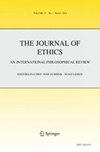Kant on the Normativity of Obligatory Ends
IF 0.8
Q3 ETHICS
引用次数: 0
Abstract
Abstract I propose a novel way to understand the stringency of Kant’s conception of beneficence. This novel understanding can ground our intuition that we do not have to forego (almost) all pursuit of our personal ends. I argue that we should understand the application of imperfect duties to specific cases according to the framework set by the adoption and promotion of ends. Agents have other ends than obligatory ones and they must weigh obligatory ends against these other ends. Obligatory ends are special among ends only insofar as their adoption is not optional. My reading of the normative status of imperfect duties affords a way of thinking about beneficence modelled on the everyday ways in which agents pursue their personal projects and weigh different ends against each other. This establishes a middle-ground between an extremely demanding conception of beneficence and an overly latitudinarian one. Furthermore, it helps us understand why we do not have to be maximally beneficent and why there is a bias towards the near in our thinking about rescue cases.康德论义务目的的规范性
摘要本文提出了一种新的方式来理解康德“善行”概念的严谨性。这种新颖的理解可以使我们的直觉成为基础,即我们不必放弃(几乎)所有对个人目标的追求。我认为,我们应该根据目的的采纳和促进所设定的框架来理解不完全义务对具体案例的适用。除了义务目的,代理人还有其他目的,他们必须权衡义务目的和其他目的。强制性目的在目的中是特殊的,因为它们的采用是不可选择的。我对不完美义务的规范地位的解读,提供了一种思考慈善的方式,这种方式以代理人追求个人项目的日常方式为模型,并权衡彼此的不同目的。这在一个极其苛刻的慈善概念和一个过于自由主义的概念之间建立了一个中间地带。此外,它有助于我们理解为什么我们不必最大限度地行善,以及为什么我们在考虑救援案例时倾向于就近。
本文章由计算机程序翻译,如有差异,请以英文原文为准。
求助全文
约1分钟内获得全文
求助全文
来源期刊

Journal of Ethics
Arts and Humanities-Philosophy
CiteScore
1.50
自引率
0.00%
发文量
21
期刊介绍:
The Journal of Ethics: An International Philosophical Review seeks to publish articles on a wide range of topics in ethics, philosophically construed, including such areas as ethical theory, social, political, and legal philosophy, applied ethics, meta-ethics, the metaphysics of morality, and the history of ethics. The Journal of Ethics publishes work from a wide variety of styles including but not limited to the analytic tradition and hermeneutics. The Journal of Ethics is also interested in ethical thinking that is enriched by psychology, sociology and other empirical disciplines. The Journal of Ethics is primarily an organ of philosophical research, although it publishes work on topics of concern to academics and professionals alike. The journal also seeks to publish the highest quality commentaries on works published in its pages. Its double-blind review process must ensure analytical acuity as well as depth and range of philosophical scholarship.
At the moment, the journal does not publish book reviews.
 求助内容:
求助内容: 应助结果提醒方式:
应助结果提醒方式:


